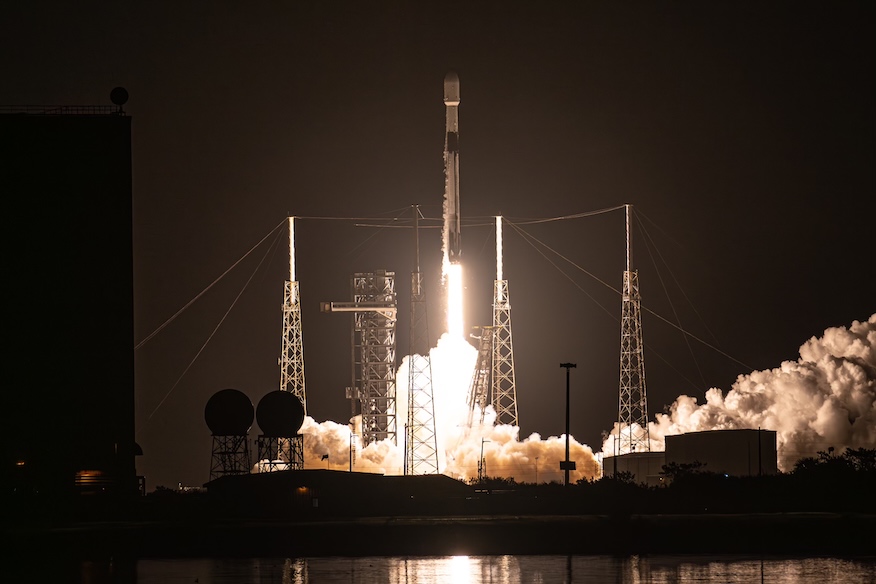
The orbital launch year in Florida began the same way it ended in 2023: the launch of a SpaceX Falcon 9 rocket. A communications satellite for Sweden-based Ovzone was on board the Workhorse launch vehicle. The rocket's liftoff occurred during the opening of the ten-minute launch window, which began at 6:04 PM EST (2304 UTC). It marked the second Falcon 9 flight in less than 24 hours, following the launch of 21 Starlink satellites from California late Tuesday.
The mission launched the Ovzon-3 satellite into geostationary orbit, marking the first privately funded Swedish satellite launch.
SpaceFlight Now will have a live broadcast with commentary from the cabin an hour before takeoff.
“Sweden has a strong history in the satellite area, but this is a first for Sweden and I think we are very proud,” said Kristofer Alm, Chief Marketing Officer of Ovzon. “I think Sweden is very strong to continue our growth.”
Following Wednesday's launch, the satellite will reach its orbit of 59.7 east over the next three months. Once it gets there, Ovzon will begin its full testing campaign. The plan is for the satellite to be fully operational by mid-2024.
“The good thing is, we're not done yet. We're going to continue to add capabilities,” Alm said. “Obviously, some of those capabilities will be customer-driven, and some we'll do because it's on our roadmap.”
At its core, the Ovzon-3 satellite is designed for critical missions known as near-peer capabilities. The idea, Alm said, is for the satellite to be powered to help resist jamming or other intrusive operations without relying on the ground portion of the architecture.

The satellite has five directional spot beams that allow for spot adjustment providing greater user capacity and will work with Ovzon's satellite terminals.
“Defense is our main target market. Defense is where we're most successful, but we're starting to expand. We have national security, public security,” Alm said. We do the same as services. They need a service that can be implemented quickly.”
“That's another part of our advantage, we have a full service chain. So, basically we can activate and deploy a network in 24 hours,” added Alm.
Meeting the growing challenge
Ovzon, founded in 2006, provides a service for leasing on-orbit capacity through the use of its on-the-ground terminals. One of the company's major clients has historically been the US Department of Defense.
Over the years, Ovzon leaders decided it was important to have their own satellite to expand their capabilities and offer a new service to government customers in the European market.
“We've always been a Swedish company with an American customer base, and now we're a Swedish company with an American and European customer base, which I think is really exciting,” Alm said.

Alm pointed to the ongoing Russian war in Ukraine as a moment of evolution, with the global community having a greater appreciation for citizenship-based critical communications. He said the market is more ready for this type of service now than it was two years ago.
“One thing that happened when the Russians went into Ukraine, they disabled satellite communications. How did they do that? Well, they knocked out the ground segment,” Alm said. ' are like.
“So they've studied what's going on there and we can bring capabilities to address that,” Alm added. It means that the story we present is now more relevant to a lot of European customers.
Worth the wait
The launch of Ovzon's first satellite marks the first privately funded satellite for Sweden, but it has faced some headwinds. A combination of production delays and the Covid-19 pandemic put the satellite notably behind schedule and the cost of the launch was estimated at around 2 billion Swedish krona (equivalent to approximately $195 million). It was originally planned to launch on Ariane 5 but was not ready to fly before the European workhorse rocket was retired.
Despite the struggles, Alm said they received strong support from their financial backers on the way to launch.
“Obviously, expectations are high and now we are [ready to launch] “They're going to be more, but we see it as a challenge and I think we're ready to take it on,” Alm said. “Obviously, it's ours to deliver now, and I think that's part of the excitement of what's to come, because now we've been given a tool that will allow us to continue to grow.

The beginning of a great year
The launch of the Ovzon-3 satellite promises to be a historically busy year for SpaceX. The mission will be the second orbital launch of 2024 for SpaceX and the first mission of the year with a paying customer.
The first stage booster supporting the mission, tail number B1076, will make its 10th flight to date and return to Landing Zone 1 at the Cape Canaveral Space Force Station eight minutes after liftoff.
The mission has been a busy two months for SpaceX, which will be highlighted by two crewed missions to the International Space Station, the launch of the Northrop Grumman Cygnus spacecraft to the ISS, and a mission to the moon with Intuitive Engines' Nova. -C Lander.
In a statement on X, formerly known as Twitter, SpaceX Vice President of Launch Kiko Dontsev reiterated the company's goal of 144 launches by the end of the year.
“The launch system (pads, recovery, flight hardware) should be capable of 13 [per] month so we can catch up when scheduled maintenance, failures and weather inevitably slow us down,” he wrote.
We are targeting 144 releases by 2024 (12 per month). The launch system (pads, recovery, aircraft hardware) needs to be capable of 13/month so we can catch up when scheduled maintenance, failures and weather inevitably slow us down.
— Kiko Donchev (@turkeybeaver) January 3, 2024
